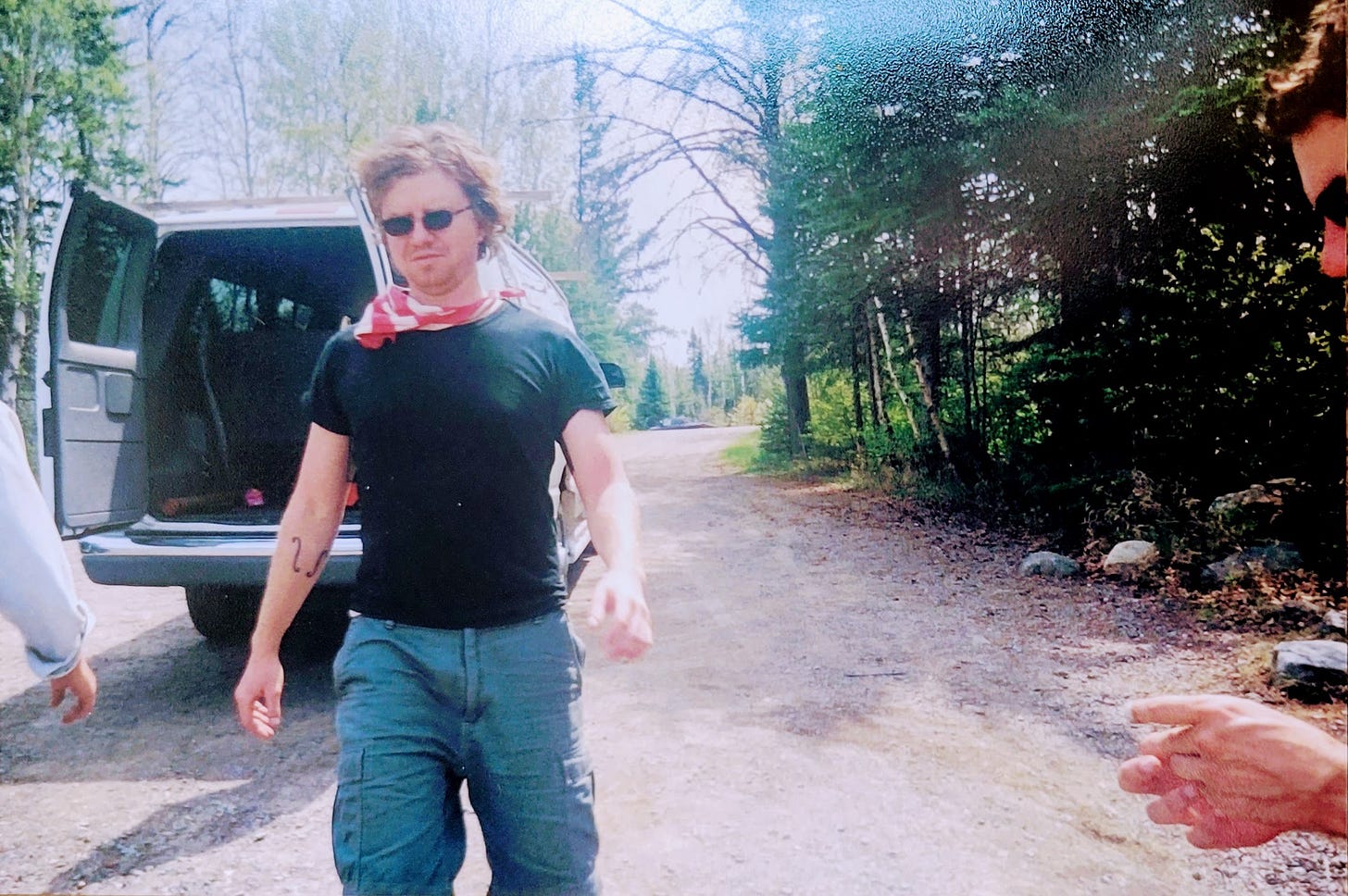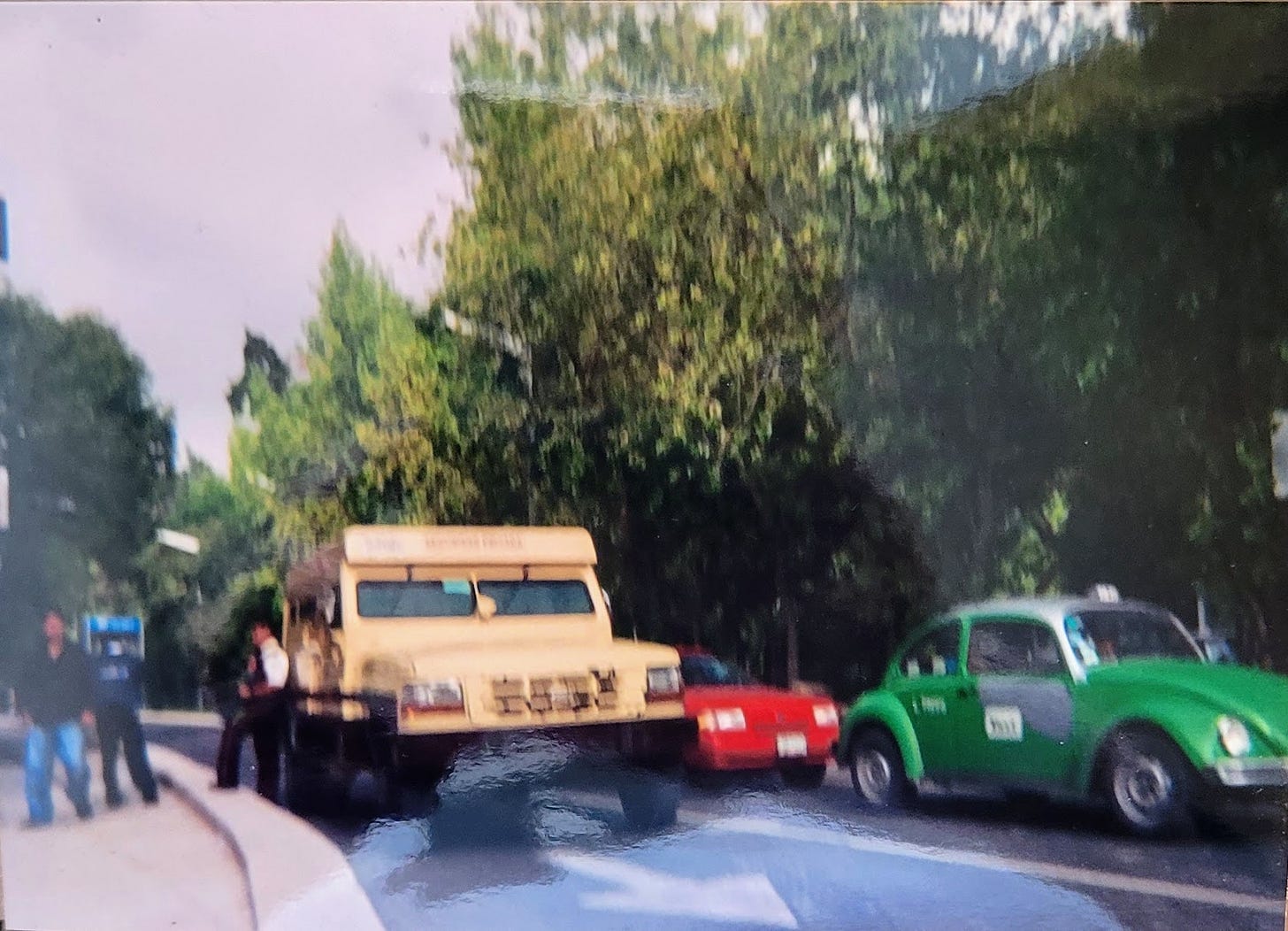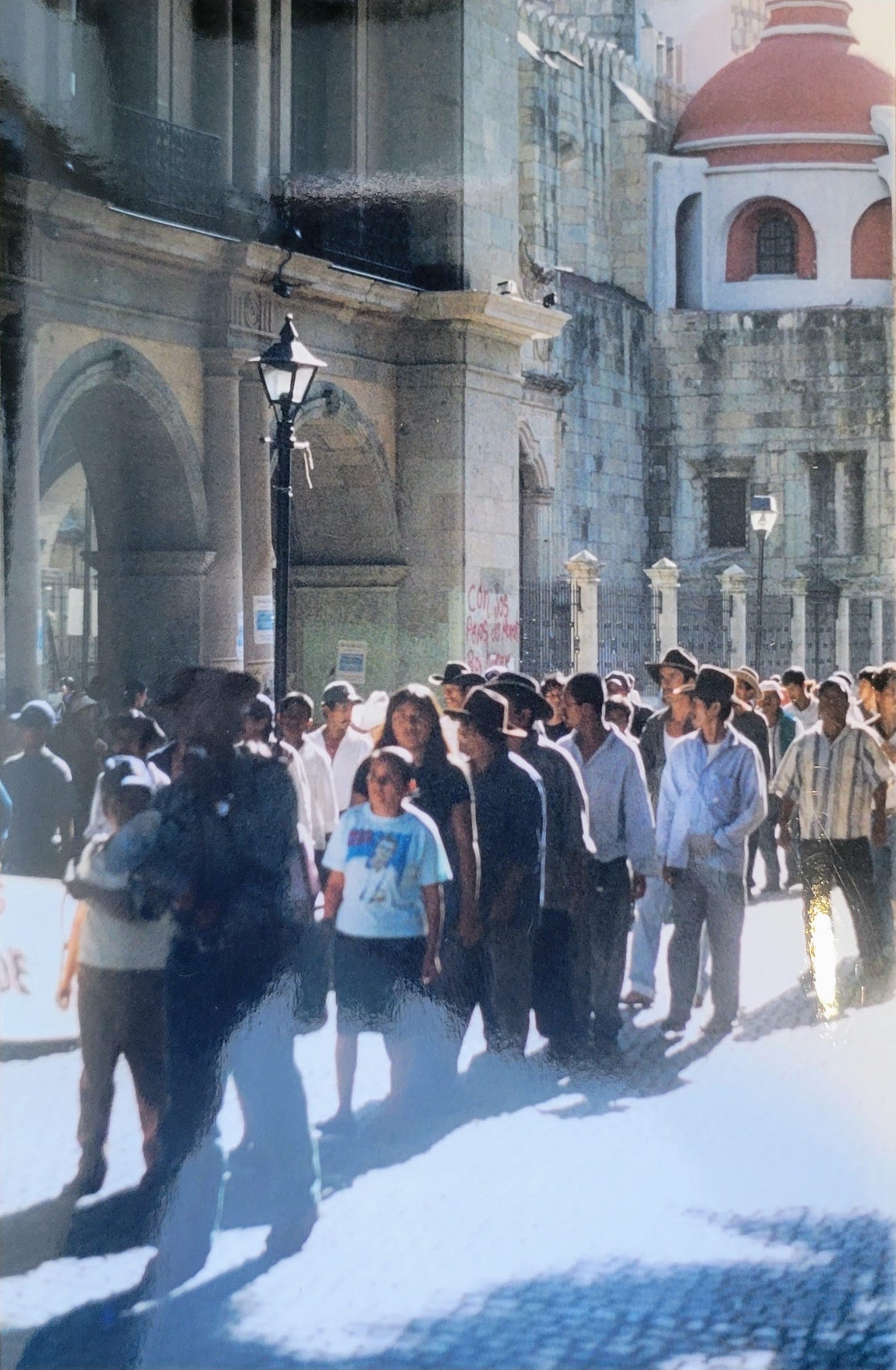A History of My Life in Near-Death Experiences
Goodbye CoinDesk, Long Live the New Flesh/Markets.
Hello and welcome to the many new subscribers who have joined us in the past few days – your support is truly appreciated.
That’s because, for anyone who hasn’t heard, I was let go from CoinDesk last week in a massive wave of layoffs related to an ongoing sale of the company. I’m personally in good shape, and frankly I’m enjoying the change of pace.
But I was one of a huge number of cuts, amounting to the breakup of an all-time great journalistic team. Even in finance, it seems, merely doing great reporting is not enough to make an operation financially viable, which is a terrifying reality I’ll be thinking about a lot.
Risk, Resilience, and Meaning
This is now the second time I’ve been impacted by the dismantling of a great journalistic operation because of business failures higher up the chain of command, so to a certain extent it’s just par for the career course. You’re taking a risk even committing yourself to this work – getting fired is a muscle you build up. You learn to look out for the next chance.
In short, journalism is one of many life paths that involves serious trade-offs between enjoyment and security. You get to do great, impactful work, but you have to approach it with a resilient and risk-taking mindset. I had to take huge risks to get where I am, among other moves transitioning from a stifling but defined academic career to the weirder world of “being a writer.”
I think that willingness to weigh and take risks is a product of my upbringing. That includes living abroad as a kid, but even more how much time I spent in the wilderness. Broadly, I’ve spent a lot of time in environments that I couldn’t control – but whose rules I could master, with a little patience.
In my twenties and thirties, I leveraged that resilience into a series of truly wild adventures that built my resilience further – doing things like hitchhiking up the West Coast and hanging out with peasant activists in Oaxaca. I’ve nearly died numerous times, just counting instances I was aware of.

This kind of resilience isn’t mainly a matter of personal career development, though. It can seem like real determination is on the decline in the developed world, which has serious implications for society.
At the risk of sounding like a boomer, kids these days don’t seem to embrace productive risk. Statistics about people now in their teens and twenties show worrying signs of retreat from doing hard or risky things, from romance to travel to experimenting with drugs. What seems at risk is, in a word, adventurousness – in ourselves, in our children, and as a culture.
And the word that comes after adventure is story. I have so many stories, so much life already behind me even at the midway point. And I would argue, biased though I am, that having a story about yourself is the most vital element of being a happy person – it is what gives you meaning. If the meaning of your story is the ability to overcome challenges, then that story is the truth.
My recent post on restoring focus in the face of digital distractions and pandemic horror has proven extremely popular, and a major part of that is how to prime yourself to take risks again. I will be writing much more about how to nurture a sense of adventure, whether in the face of a layoff, or things even bigger and scarier. Today’s newsletter ends with a brief catalog of my own many crazy adventures, by way of setting the table for that project.
But first, a programming note.

Long Live the New Flesh/Markets
As longtime subscribers know, this Substack has for several years now been a roughly monthly outlet for my weirder and more theoretical explorations. The name of the newsletter is an attempt to encompass the boundary where my mind tends to thrive – the unhealing seam between trade and life, between rational markets and the horror of senseless exploitation.
That will not change – weird, big, thought pieces will remain the cornerstone of the lineup.
But starting soon, I will also be taking advantage of my suddenly expanded bandwidth to file shorter pieces here, similar to the work I was doing at CoinDesk, on topics in finance and technology. Sooner rather than later, the goal is to implement a paid tier. So I am very interested in hearing from new and old subscribers about what you’d most like to see from me, either in general or specifically as something you’d be willing to pay a few dollars a month for.
Flesh/Markets Starter Pack
For new arrivals, here’s a roundup of Flesh/Markets high points so far, the posts that encapsulate what I’m here for and that people have reacted to best:
Towards a Program for the Resurrection of Focus – Many, many people have found themselves struggling with serious intellectual work during and after the pandemic. This is the first in a series that describes specific, actionable strategies for increasing focus in the era of social media brain-rot and lockdown madness.
Finance as Time Travel: Venture Capital On Arrakis – Finance, and venture capital in particular, is a way of bringing future profits into the present. This three-part series uses Frank Herbert’s Dune as a jumping off point for exploring the deep contradictions of the trap embedded in attempts to predict the future. Part 2 examined the Gamestop trade as a failed revolution against the future-makers. Part 3 dives deep into the Jacque Lacan’s theories of time, money, desire, and prediction. (I hope to someday develop this material into a book.)
AI ‘Consciousness’ is the Next Huge Tech Grift – One thing my work at CoinDesk has kept me from fully developing is my critique of the ridiculous midwits who make up the so-called “AI Safety” movement. They are a bunch of clownish idiots, and one specific piece of pre-print research from a Stanford psychologist exemplifies just how embarrassing it all is.
Nothing is True, Everything is Exchangeable – Do Kwon is one of the stupidest people to ever live, while Jean Baudrillard was (despite his patented Franchophone ridiculousness) one of the smartest. Do Kwon, as an object and expression of history, lived out the theory that Baudrillard had articulated a half-century before – the theory that, as capital develops, there is less and less behind it, until there is nothing at all.
I Demand a Remaster of Nicholas Cage’s “Drive Angry” – It’s not all philosophy of money around here. I’m also a real junky for genre film, particularly horror, as well as pure experimental weirdness. Frequently I’ll include a blurb about a new or old piece of ephemera, but sometimes I’ll devote a full post to a real gem.
A History of My Life in Near-Death Experiences
Now it’s time to talk about myself.
In the wake of my departure from CoinDesk, I’ve had a huge and very appreciated wave of support, including a lot of people telling me just how much they value my work. I also recently had my now-former coworkers inform me in no uncertain terms that I am “eccentric,” which I really thought I had been hiding more effectively.
So it seems a good moment to try and articulate just what might have led me to stand out from the pack, even if that amounts to “why am I so great” navel gazing. A lot of people have been telling me how great I am, so fuck it, I guess.
At a high level, I’m an effective commentator and columnist because I’m not afraid of much. There are plenty of reasons not to speak out, to not say what you mean, to in fact have nothing to say. If you’re the annoying guy pointing out problems, in today’s America you’re going to get fired. And in crypto, I deal with actual criminals on a regular basis, including organized crime, so the fear is not entirely just professional or abstract.
Of course, part of my profession is negotiating that, being smart and knowing where the boundaries are. But I think a more important element of my lack of fear is that I’ve continually thrown myself (willingly, rationally, and with crucial backup) into situations of risk, hardship, and deprivation.
I’ll tell a few of these stories in more depth, but here’s the basic timeline.
- Age 10 – Moved to Japan - with my family and lived there for 2 years. Learned basic Japanese, ate weird food, got treated racist-ly (which should be a mandated experience for every white person), all kinds of horizons got blown wide open. Most fundamentally, it primed me to move around a lot and navigate novelty.
- Age 13-15 – Camping – I spent many years camping, with my Dad and later in Boy Scouts, and doing things like learning to shoot and use a knife. My first big multi-day expedition was a 3-day canoe trip in Texas. After this I did a pair of two-week expeditions at Philmont, a scout ranch in New Mexico, which is pretty much Disney Camping, with a lot of support. Very fun, but not enough for me.
- Age 16 – Rayado – An intense three-week expedition that included things like hiking at night through swamps, summiting mountains before dawn, and spending long stretches alone and lightly supervised in the middle of absolutely nowhere. Still a Boy Scout program, but this left Disney camping behind and threw me into some real backcountry work. (Notably, this experience would be nearly impossible to recreate today because our entire society and legal system has become so risk-averse - a topic I’ll definitely explore.)
- Age 19 – Philmont Guide – I had been a counselor at Worth Ranch in Texas, then got accepted to be a backcountry guide at Philmont the summer after my first year of college. I taught young kids how to light fires and stuff, but also spent a lot of time on my own, miles from anywhere. When you’re truly alone and self-reliant, you get very good at managing risk, or you die. (Also, as a footnote, not long after this I got involved in anti-Iraq war protests in Austin, which were their own wild thing).
- Age 22-23 – Hitchhiking the West – After graduating from college, I spent three months road-tripping and hitchhiking from Texas, through New Mexico and Arizona, up the California Coast, all the way to Washington State. It was an incomparable experience and I nearly died twice, once in a freak desert hailstorm, and once to a semi-truck as I tried to walk across an overpass at night. Good stuff.

- Age 23 – Oaxacan Uprising – I soon wound up in Oaxaca, in southern Mexico, in the wake of what’s known as the Agua Fria massacre. Teachers and peasants were occupying the town square of the big city there, and I had a friend who was helping them out. The idea was to write about the experience, but I never really did. False starts and all. Roughly a year or two after I came back, an American documentarian named Brad Will was killed, likely by government paramilitaries, for covering the same conflict, in the same Oaxaca city square. (I don’t count this as one of the times I nearly died, though.)

- Age 28-29 – Back to Japan – The last two years of grad school, I travelled to Japan frequently, and wound up living there for another year when I got a fellowship to serve as a visiting researcher at Geidai (Tokyo University of Fine Arts), Japan’s leading art school. I somehow figured out how to rent an apartment and register for national health insurance in Japan with basically no help, still to this day one of my proudest accomplishments.
- Age 31 – Occupy – The direct reason I wound up writing about cryptocurrency. From Tokyo, I moved to Tampa, Florida for a second fellowship, this one at the University of South Florida. My first year in Tampa was very preoccupied with participating in the fairly robust Occupy movement in Tampa. This involved interacting with a truly crazy spectrum of people (in several senses).
- Age 33 – Quitting Academia – I had become skeptical of a career as an academic researcher near the end of finishing my doctorate, but my experience of how lazy and indifferent many academics were was what finally put me off. (Though it helped that, post-Financial Crisis, nobody was exactly clamoring to offer me a tenure track job). So I made like $30k-$50k a year for a while as I figured out how to write for money.
- Age 36 – New York City – It turned out I was good at writing for money. And by 2016 I had met my now-wife, who wanted to be a painter. We moved to New York, which as you might imagine involves a ton of risk and uncertainty and hardship and challenge. But it led to me getting my first staff writing job at Breaker, and from there moving to Fortune, then CoinDesk, then … whatever’s next.
Those are the highlights. It’s been a crazy ride, partly thanks to the experiences my parents put in front of me (like it or not), and partly thanks to choices I’ve made. (On looking back, it occurs to me that this may all be less about resilience than about getting bored very, very easily, but we’ll overlook that for now).
Looking Forward
So, all of that is to set the table for a few upcoming pieces about resilience and risk. At the very highest level, I want to advocate for something like re-wilding, a concept derived from the ideas of, by and large, the anarcho-primitivist philosopher Jonathan Zerzan.
Of course, I live in Brooklyn, so you might think it’s a nonsensical argument, but maybe not – in part, I want to argue that the human city, at its best, offers many of the same appeals and benefits of the wild itself.
Other upcoming major topics will include coverage of the Sam Bankman-Fried trial; reflections on how exactly CoinDesk wound up being, for a hot minute, one of the greatest teams on Earth; a reflection, as we move through the 50th anniversary of Hip Hop, of its weirdest outlying wings; and, finally, my long-threatened treatise “An Introduction to Horror Economics” – an argument that has its own larger theory about risk.
I’m very, very lucky to be here, still, doing what I do. Your support is incredibly meaningful.




The way it was was never the way it was going to be, David. Can't wait to read whatever comes next 🫂